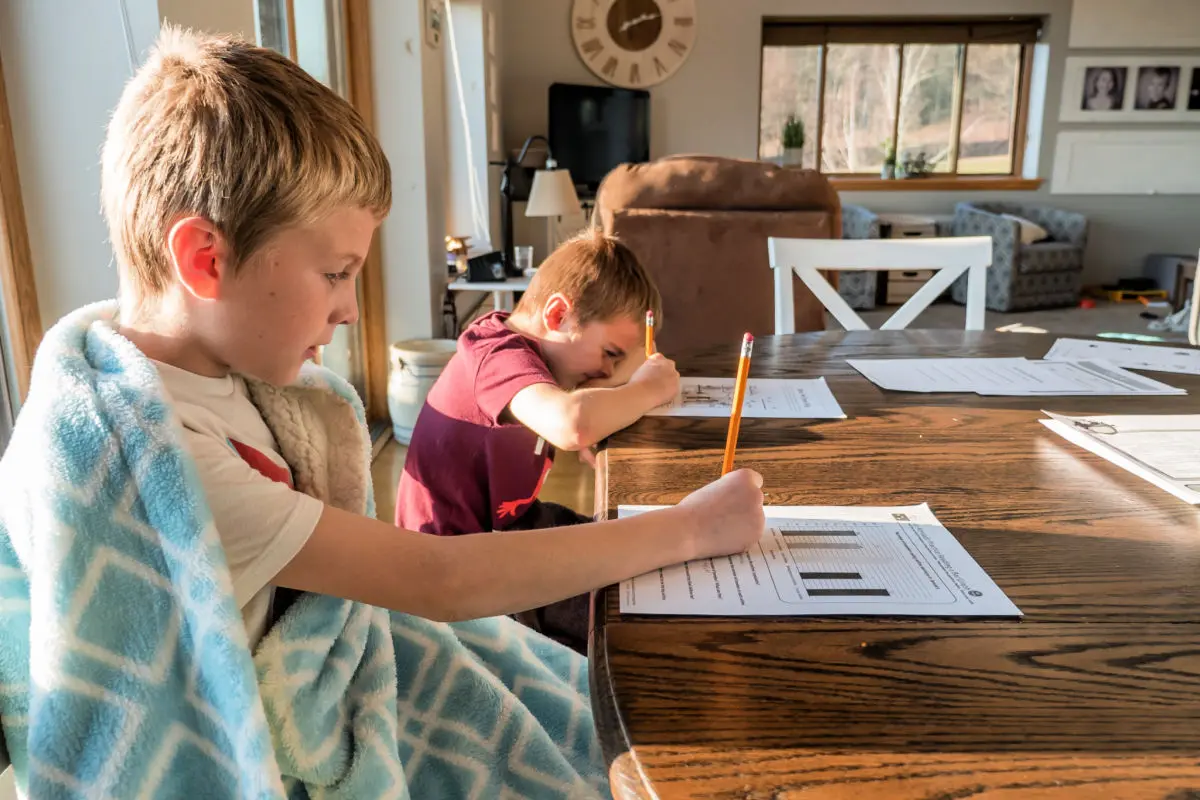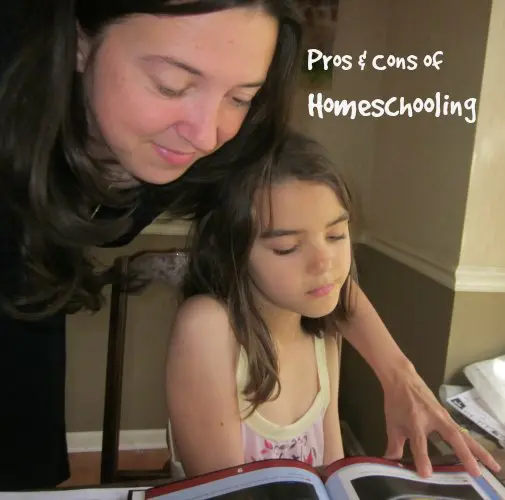Here, I share what I believe are the pros and cons of homeschooling based on my own experiences. I’d like to begin by saying I’m not an “expert” on the subject of homeschooling. What I will say is this, I was homeschooled for the first 12 years of my life and I have been to almost every type of school possible in the United States: charter, public, magnet, block-scheduled, and private. Also, I’ve gone to a variety of different schools across the United States from here in the South to the West Coast.
This post was first published April 15, 2014. I have made a few updates and shared it again for my new readers to enjoy.
The Pros and Cons of Homeschooling vs Public Schooling
There is a lot of speculation, research, conferences, etc. on whether or not homeschooling has a negative or a positive consequences on young minds. In my opinion, homeschooling can go either way. Like majority of things in life, homeschooling, if done incorrectly, can have a negative impact. But, that isn’t to say sending your child to a public or private school is a sure bet either. Just like homeschooling, public schooling, if done incorrectly, can have negative consequences. I’ve been to a fair amount of different schools, and let me just say this, no two were the same.
I’m not here to convince you about homeschooling one way or another but I am going to give you a perspective that I don’t feel has really been shared: the perspective of someone (myself) who has experienced not only the world of homeschooling but also a little bit of what the other educational systems have to offer.
Pros of Homeschooling:
Homeschooling offers several potential benefits. Parents can tailor the curriculum to suit their child’s learning style, pace, and interests, potentially leading to a more effective and enjoyable learning experience. Homeschooling allows for flexible schedules, making it easier to accommodate travel, family time, or other activities. With fewer students to teach, parents or tutors can provide more individualized attention, helping children grasp concepts more easily. Parents can ensure a safe and supportive learning environment, free from bullying or other negative influences that can sometimes be found in traditional schools. Furthermore, homeschooling can strengthen family relationships as parents spend more time with their children and become more involved in their education.
One-on-one tutoring/interaction
A child can get attention from the teacher anytime they need it or all the time if they need that!
Hands-on teaching and experiences
It’s sad, but the public school system doesn’t have the resources to allow children to have the experiential learning that homeschoolers are given.
I think this You Tube video is a great example of what hands-on experiences can do for young adults!
Different learning styles can be accommodated
With homeschooling, the parent can mold their teaching around their child’s specific needs.
The ability for the child to go at their own pace
While students in large group classes are required to go at the pace the instructor chooses, students in a home school environment have the ability to take more or less time on a lesson subject as required by their needs.
Control of the child’s environment
The parent has control over the environment of the child whether this is the children he/she hangs out with, their influences, etc. This might seem controlling, but let me just say this—I wasn’t prepared for the amount of adult oriented content I was bombarded with during my first week of school at a Charter school in the 7th grade. So, with that being said, maintaining the innocence of your children is a crucial part to letting them enjoy their childhood. Trust me, they’ll learn about all that information eventually, but let them enjoy naivety for as long as they can.
The parents are more involved in their child’s life.
This is a wonderful thing! You have the opportunity to interact with your child and experience their interests, thoughts, emotions, etc. on a much more intimate level.
8 hour days of sitting still listening to lectures are gone!
Yes, I can already hear you, “when are they going to learn how to handle an 8 hour workday? Or 12?” Well, let me just say this, You don’t learn how to handle working an 8-hour day by going to school 8 hours a day. Functioning adults don’t like to sit through an hour meeting but you expect your child to be fully alert for 8 (55) minute classes? I don’t think so.
There isn’t anything wrong with long classes; I support them! I think they are wonderful. In fact, I think classrooms should have 90 minute long classes, made up of a mix of hands-on activities, working with groups, listening to lecturers, reading on your own, etc. (this was my experience with block-scheduling, which I am a huge advocate for. It was by far the most rewarding standardized institution education I received pre-college). In fact, this even means you can be freed up to travel while homeschooling!
Specialized interests
The child has the time and energy to explore special interests in greater breadth and depth. Having a flexible schedule means you get to be apart of a variety of different things. For instance, during homeschooling, I was able to attend gymnastics, dance, piano, watercolor painting and I still played outside every day.

Cons of Homeschooling
It’s important to note that homeschooling also has its challenges. A few of these more difficult points include the need for parents to take on the role of educator, potential socialization concerns, and varying legal requirements depending on the jurisdiction.
Knowledge Constraints
If resources aren’t used you can be constrained by how much your parents know about a given topic. When I was homeschooled, my parents were able to sign me up for classes taught at Universities on topics I was either interested in or were beyond their expertise. Also, for younger kids they have co-op classes, online classes, tutors, and programs to sign up for classes taught by teachers but in small group environments where they’ll still get the one-on-one attention.
Limited Resources
Depending on where you live, it can limit your resources to co-ops, tutors, University taught classes, etc.
Social Circles can be limited.
I was lucky in that I had a larger group of friends through homeschooling. Also, in my experience, homeschoolers do not have cliques. We were too busy enjoying the fact we were at the pool at 12pm on a Wednesday afternoon in April (I lived in California at the time) then to be worried about which clique we belonged in.
Homeschooling isn’t easy. It’s hard work, very hard work.
I think this is because the parents have to be well informed on how to homeschool as well as go the extra mile to make sure they are giving their children the means necessary to succeed, be flexible, as well as plan and be apart of the hands-on experiences. It takes a lot of effort and willingness from both parties.
It can be misused.
While I completely understand religious reasons to homeschool your kids, do not let this negatively impact their education and later on in life, their livelihood. It can and will if you let it.
Can limit exposure
Do not use homeschooling to limit your children’s knowledge. Use it to expand it. I think this is a philosophy often overlooked in the homeschooling world. I came across so many parents who wanted to curb their children’s education by only teaching them one specific view. However, what they didn’t realize was they were limiting their children’s understanding instead of giving them the tools to think critically and draw their own conclusions. So when they went to test for their SATs or ACTs or were accepted into college they were blindsided. Your child is going to find out about things eventually. Don’t make it a negative thing that affects their life when they do.
It can be more costly in the beginning.
The cost of homeschooling may be high when making the switch from public schoooling. However, there are a lot of helpful resources out there on how to lower the costs of courses/tutors your child might need, activities, and curriculum.
Conclusion
With homeschool, parents can incorporate their values, beliefs, and cultural background into the curriculum, providing a more holistic education. Some homeschooled students excel academically, often performing above average on standardized tests. Another positive point is that homeschooled children may experience less peer pressure and bullying. This can allow children to focus more on their studies and personal development.
Oh the other hand, homeschool has cons as well. Homeschooling requires a significant time commitment from parents or caregivers, who must plan lessons, teach, and assess their child’s progress. While homeschooling can be cost-effective compared to private schools, there are still expenses for curriculum materials, resources, and possibly tutors or online courses. Furthermore, not all parents feel equipped or have the necessary skills to teach certain subjects. This is especially true as children get older and the material becomes more advanced.
Overall, homeschooling is a big decision and one that shouldn’t be made lightly. I would suggest looking into the resources available in the city you live in or cities near you. Research the finances, past family stories, the network in your area, the regulations, etc. Also, if you are considering homeschooling, a great way to see if homeschooling is right for your family is to write down what you think the pros and cons are. Think about what type of educational experience you want to give, and align that with your options. Homeschooling can be an amazing thing and a great opportunity for children to experience. Personally, I loved it!
Have you ever considered homeschooling, how did you decide? What were some of the pros & cons of homeschooling you found? Are you homeschooling? What have been some of the struggles and achievements?
Related Posts:
BIPOC Communities And Access To High Quality Education


Leave a Reply